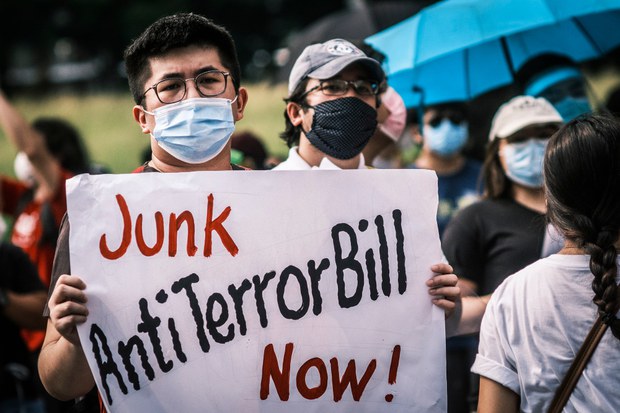Philippines Probes Surge in Fake Facebook Accounts
2020.06.08
Manila and Bacolod, Philippines
 Activists take part in a demonstration against an anti-terrorism bill in Quezon City, Philippines, June 4, 2020.
Activists take part in a demonstration against an anti-terrorism bill in Quezon City, Philippines, June 4, 2020.
Updated at 7:58 a.m. ET on 2020-06-09
The Philippine government launched investigations Monday into a surge of fake Facebook accounts, which allegedly have been using the identities of students, journalists, activists and opposition figures, as resistance to newly passed anti-terrorism legislation grows.
The duplicate accounts were discovered over the weekend by students at the University of the Philippines who were protesting against a bill that seeks to overhaul the country’s existing anti-terror law. The Department of Information and Communication Technology (DITC) was among government agencies that opened investigations into the creation of fake accounts on the social media platform.
“The DITC does not condone these acts and is strongly against these abuses on social media and other online platforms,” the agency said in a statement.
“The DICT is closely working with National Privacy Commission and has drawn the attention of Facebook Philippines regarding this matter. Facebook has assured they are currently investigating the reports of suspicious activity on their platform,” it said.
Congress last week adopted the anti-terror bill, which still requires President Rodrigo Duterte’s signature to become enacted into law. The legislation would allow authorities to conduct warrantless arrests and hold terror suspects for at least 14 days, among other new provisions.
Critics have complained that Duterte’s administration could use the law to clamp down on legitimate dissent.
Also on Monday, Justice Department spokesman Mark Perete said authorities had received at least 100 complaints about fake Facebook accounts and described them as a serious violation of the country’s criminal laws on cybercrime.
“This gives me cause for worry. We don’t need false information at a time when we’re dealing with a serious public health crisis,” Philippine Justice Secretary Menardo Guevarra said as he ordered a separate investigation.
Perete said justice investigators planned to ask Facebook officials to preserve the fake accounts so they could track down the people behind them.
“We will be able to determine, not only the subscriber who created the account, we also want to know what terminal and what ISP they used, the content of each account and what data was transferred using these accounts,” he said.
The DICT, meanwhile, said that its Cyber Security Bureau was working with law enforcement agencies to go after those behind the fake accounts, and encouraged those affected to report them. Among those complaining about fake accounts are journalists, including members of the Foreign Correspondent of the Philippines.
The Washington Post reported that at least one fake account had threatened sexual violence against a student at the Polytechnic University of the Philippines.
Facebook responds
In a statement, Facebook said it had instituted stricter online protocols while it was working to weed out fake accounts.
“We understand the concerns raised by our community in the Philippines. We’re investigating reports of suspicious activity on our platform and taking action on any accounts that we find to be in violation of our policies,” it said.
“Where they fail our authenticity checks, the accounts will be removed,” the statement said.
Social media expert Jonathan Ong, a Filipino professor at the University of Massachusetts, called the proliferation of fake accounts alarming.
“So to me the use of ‘cheap fakes’ raises the primary question of how this was actually done before we speculate on why this was done,” said Ong, who has tracked the evolution of fake social media accounts since 2016.
“I’m personally worried as I can see that my mom has several fake accounts,” Ong said in a Facebook post. “Thank goodness there’s way too many Jon Ongs in the PH, Singapore and Malaysia for me to see my other cheap fake namesakes. I see tho that some cheap fakes include faces or even homophobic slurs – so what personal information of ours do they have access to?”
The Philippines has more than 109 million Facebook subscribers, according to Internet World Stats, which measures usage and population statistics in the region.
President Duterte has tapped into this huge advertising base, including by hiring a popular blogger and former dancer, Mocha Uson, as part of his cabinet. She is backed by more than 5 million followers on Facebook, which she has used to smear political opponents of the president.
NOTE: This version replaces the main photo used in the original version.







